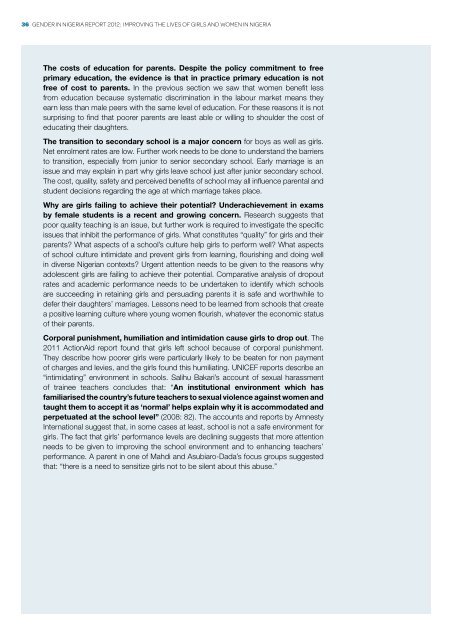Gender in niGeria report 2012 - Economic Commission for Africa
Gender in niGeria report 2012 - Economic Commission for Africa
Gender in niGeria report 2012 - Economic Commission for Africa
Create successful ePaper yourself
Turn your PDF publications into a flip-book with our unique Google optimized e-Paper software.
36 <strong>Gender</strong> <strong>in</strong> Nigeria Report <strong>2012</strong>: Improv<strong>in</strong>g the Lives of Girls and Women <strong>in</strong> Nigeria<br />
The costs of education <strong>for</strong> parents. Despite the policy commitment to free<br />
primary education, the evidence is that <strong>in</strong> practice primary education is not<br />
free of cost to parents. In the previous section we saw that women benefit less<br />
from education because systematic discrim<strong>in</strong>ation <strong>in</strong> the labour market means they<br />
earn less than male peers with the same level of education. For these reasons it is not<br />
surpris<strong>in</strong>g to f<strong>in</strong>d that poorer parents are least able or will<strong>in</strong>g to shoulder the cost of<br />
educat<strong>in</strong>g their daughters.<br />
The transition to secondary school is a major concern <strong>for</strong> boys as well as girls.<br />
Net enrolment rates are low. Further work needs to be done to understand the barriers<br />
to transition, especially from junior to senior secondary school. Early marriage is an<br />
issue and may expla<strong>in</strong> <strong>in</strong> part why girls leave school just after junior secondary school.<br />
The cost, quality, safety and perceived benefits of school may all <strong>in</strong>fluence parental and<br />
student decisions regard<strong>in</strong>g the age at which marriage takes place.<br />
Why are girls fail<strong>in</strong>g to achieve their potential? Underachievement <strong>in</strong> exams<br />
by female students is a recent and grow<strong>in</strong>g concern. Research suggests that<br />
poor quality teach<strong>in</strong>g is an issue, but further work is required to <strong>in</strong>vestigate the specific<br />
issues that <strong>in</strong>hibit the per<strong>for</strong>mance of girls. What constitutes “quality” <strong>for</strong> girls and their<br />
parents? What aspects of a school’s culture help girls to per<strong>for</strong>m well? What aspects<br />
of school culture <strong>in</strong>timidate and prevent girls from learn<strong>in</strong>g, flourish<strong>in</strong>g and do<strong>in</strong>g well<br />
<strong>in</strong> diverse Nigerian contexts? Urgent attention needs to be given to the reasons why<br />
adolescent girls are fail<strong>in</strong>g to achieve their potential. Comparative analysis of dropout<br />
rates and academic per<strong>for</strong>mance needs to be undertaken to identify which schools<br />
are succeed<strong>in</strong>g <strong>in</strong> reta<strong>in</strong><strong>in</strong>g girls and persuad<strong>in</strong>g parents it is safe and worthwhile to<br />
defer their daughters’ marriages. Lessons need to be learned from schools that create<br />
a positive learn<strong>in</strong>g culture where young women flourish, whatever the economic status<br />
of their parents.<br />
Corporal punishment, humiliation and <strong>in</strong>timidation cause girls to drop out. The<br />
2011 ActionAid <strong>report</strong> found that girls left school because of corporal punishment.<br />
They describe how poorer girls were particularly likely to be beaten <strong>for</strong> non payment<br />
of charges and levies, and the girls found this humiliat<strong>in</strong>g. UNICEF <strong>report</strong>s describe an<br />
“<strong>in</strong>timidat<strong>in</strong>g” environment <strong>in</strong> schools. Salihu Bakari’s account of sexual harassment<br />
of tra<strong>in</strong>ee teachers concludes that: “An <strong>in</strong>stitutional environment which has<br />
familiarised the country’s future teachers to sexual violence aga<strong>in</strong>st women and<br />
taught them to accept it as ‘normal’ helps expla<strong>in</strong> why it is accommodated and<br />
perpetuated at the school level” (2008: 82). The accounts and <strong>report</strong>s by Amnesty<br />
International suggest that, <strong>in</strong> some cases at least, school is not a safe environment <strong>for</strong><br />
girls. The fact that girls’ per<strong>for</strong>mance levels are decl<strong>in</strong><strong>in</strong>g suggests that more attention<br />
needs to be given to improv<strong>in</strong>g the school environment and to enhanc<strong>in</strong>g teachers’<br />
per<strong>for</strong>mance. A parent <strong>in</strong> one of Mahdi and Asubiaro-Dada’s focus groups suggested<br />
that: “there is a need to sensitize girls not to be silent about this abuse.”

















